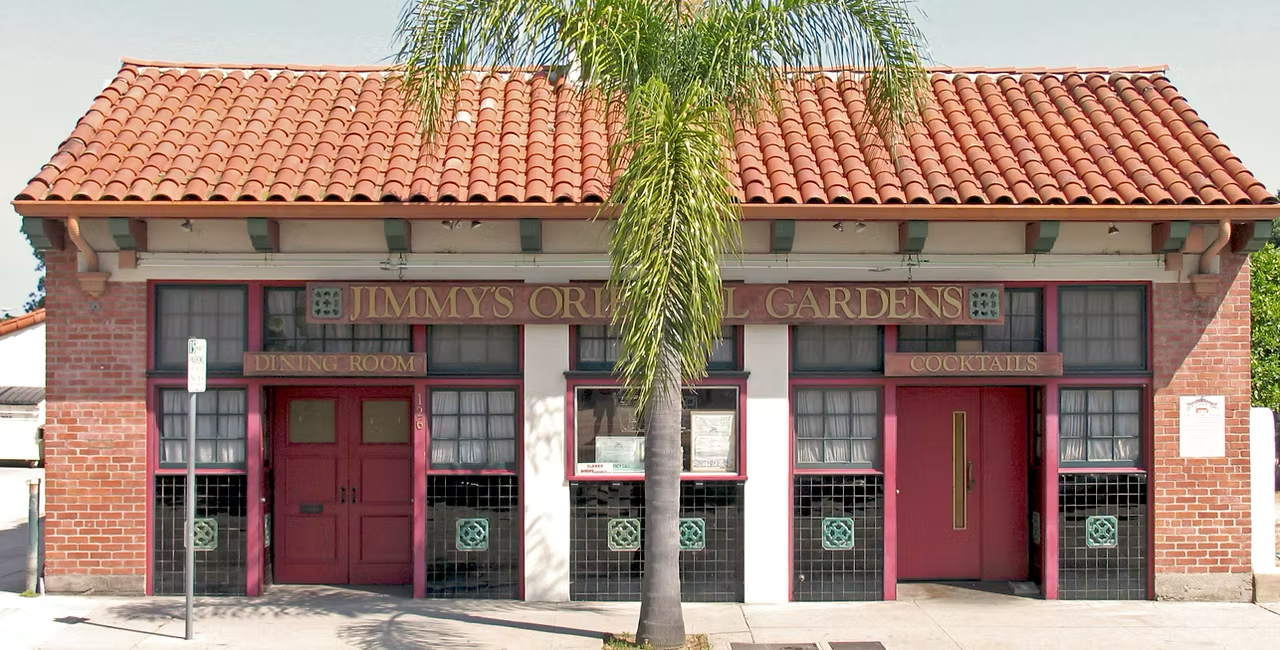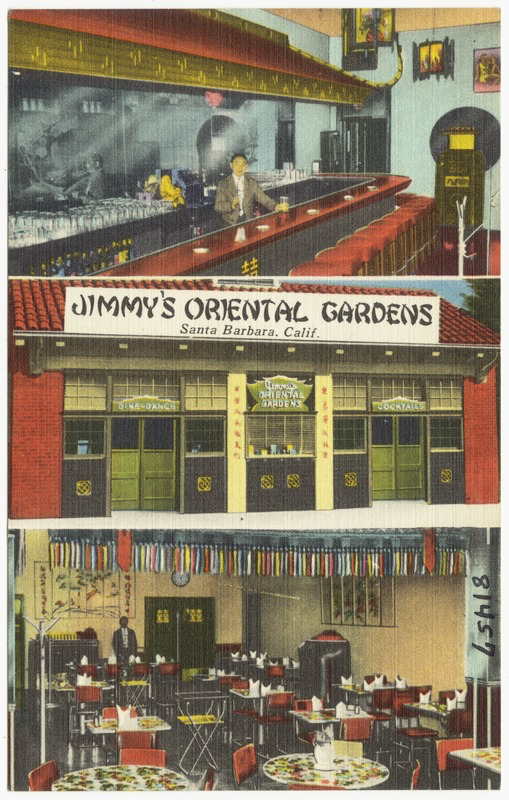
Jimmy’s Oriental Gardens:
The Legacy of Santa Barbara’s Chinatown
Jimmy's Oriental Gardens by Mike Imwalle.
Jimmy’s Oriental Gardens, established in 1947 by James “Jimmy” Yee Chung, is a tangible link to Santa Barbara’s once-thriving Chinese American community. Located at 126 East Canon Perdido Street, this establishment was more than a restaurant—it was a community hub that served locals and visitors for nearly six decades. As the last Chinese-owned business in Santa Barbara’s New Chinatown, Jimmy’s remains a testament to Santa Barbara’s Chinese American community.
Joss House, Santa Barbara 1927, by H.M. Davidson. Courtesy of the Presidio Research Center, gift of Elizabeth Hvolboll.
A Glimpse into Santa Barbara’s Chinatown
In the late 19th and early 20th centuries, Santa Barbara's Chinatown was the residential and cultural hub for the Chinese community situated along the 0-100 block of East Canon Perdido Street, between State and Anacapa Streets. Chinese immigrants, arriving as early as the 1860s, established a community complete with businesses, residences, schools, and places of worship. They contributed significantly to local industries, including abalone fishing, agriculture, laundry services, and domestic work.
However, the devastating 1925 earthquake led to a citywide reconstruction effort emphasizing Spanish Colonial Revival architecture. This initiative resulted in the displacement of the original Chinatown. In response, local contractor Elmer Whittaker developed a new set of buildings on the south side of the 100 block of East Canon Perdido Street, encouraging the Chinese community to relocate there. By 1930, this area, adjacent to the Presidio, became known as “New Chinatown,” housing various Chinese and Japanese businesses and residences. New Chinatown was adjacent to Nichonmachi, or Japantown, on the north side of the 100 block of Canon Perdido Street.

The Chung Family and Jimmy’s Oriental Gardens
Jimmy Chung with his son Bill, behind the bar at Jimmy’s Oriental Gardens. Courtesy of the Presidio Research Center, gift of Tommy Chung. James “Jimmy” Yee Chung was born in Guangdong Province, China, in 1910 and immigrated to the United States during the era of the Chinese Exclusion Act. Leveraging his family's merchant status, he settled in Santa Barbara, initially working in his father's laundry business. Jimmy later ventured into the restaurant industry, operating establishments on State Street and Cabrillo Boulevard before establishing Jimmy’s Oriental Gardens in 1947 with the support of Elmer Whittaker.
The restaurant quickly became a beloved local institution, known for its Cantonese cuisine, lively atmosphere, and community gatherings. Jimmy's son, Tommy Chung, took over the business in 1967, expanding the menu and maintaining the establishment's reputation for hospitality. Under Tommy's stewardship, Jimmy’s continued to serve as a community hub until its closure in 2006 upon his retirement.
Jimmy’s Oriental Gardens, circa late 1950s. Courtesy of the Presidio Research Center.
Preservation and Cultural Significance
Recognizing the historical and cultural importance of Jimmy’s Oriental Gardens, the Santa Barbara Trust for Historic Preservation (SBTHP) purchased the property in 2007. The acquisition included both the restaurant and the adjacent two-story Chung family residence. In 2018, the building was designated a Structure of Merit by the City of Santa Barbara, acknowledging its historic and cultural significance significance.
Today, Jimmy’s Oriental Gardens serves as a focal point for preserving and interpreting the history of Santa Barbara’s Asian American communities. SBTHP's stewardship ensures that the legacy of the Chung family and the broader Chinese American experience in Santa Barbara continues to be honored and shared with future generations.
Today, the historic building at 126 East Canon Perdido Street continues to serve the community as the home of Three Pickles Deli and The Pickle Room cocktail bar. The bar has been restored to its original appearance and contains an exhibit about the Chung Family and their business. The exterior of the building includes a mural by local artist DJ Javier celebrating Jimmy’s and the Year of the Dragon, painted in 2024. This work honors the legacy of Jimmy's Oriental Gardens by enhancing the building's unique character and continuing its tradition as a gathering place in the Presidio Neighborhood.
Location: 122 E. Canon Perdido St.
Santa Barbara, California 93101





